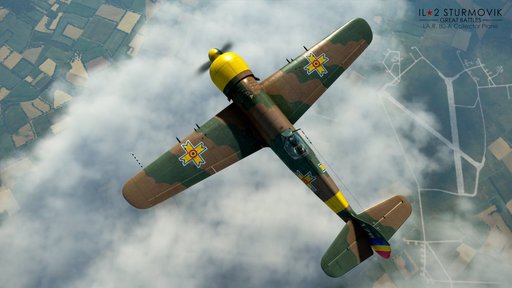
Dear Friends,
The preparation of the new update continues at full throttle. The CG-4A glider is a challenge as several new features are necessary for its towing, which have never been included in the simulation. The Western Front WWI map and the last aircraft for Flying Circus Vol. III, the R.E.8 two-seater, are almost complete and receiving final touches.
A quick heads-up: please note that due to the sheer amount of changes we're making to the Flying Circus Career mode (not only is the map much more populated but new aircraft have been added and its timeframe starts earlier) it will not be compatible with the existing careers using this map. If you currently have an ongoing WWI career, we recommend finishing it before December 19th when we will release the new update. Alternatively, you can wait for the update to start a new career.
The long-awaited I.A.R. Collector Plane is also nearing completion. In this case, however, instead of one, there will be two Collector Planes in a single purchase. The long and short variants are quite different, so they are considered distinct aircraft in the game. Each plane comes with its own modifications, paint schemes, flight characteristics, and more. The short version will be available in the December 5.201 update, with the long version following soon before the end of the Winter, likely in January.
The first Romanian fighter to be produced in large numbers was made mostly of metal, except for the stabilizer and flaps which were made of a different material. The flaps and landing gear were operated by hydraulic pressure. The I.A.R.80-A fighter series 106-150 will be the base model for the short version. This fighter was equipped with six 7.92 mm FN Browning machine guns that fired German ammunition. Its flying capabilities were comparable to those of the Yak-1, but later versions of the IAR had more powerful weapons and bombs:
- I.A.R.80-B series 181-200 had four 7.92 mm machine guns rather than six, as well as two 13.2mm FN Browning machine guns that fired 13.2 mm Hotchkiss rounds.
- The I.A.R.80-M had two 20 mm MG-151/20 cannons and two 7.92 mm FN Browning machine guns.
- The I.A.R.81 series 151-175 was equipped with six 7.92mm FN Browning machine guns and was designed to carry up to three bombs weighing up to 400 kg. The underbelly bomb rack had a distinctive parallelogram mechanism, similar to the Ju 87 dive-bomber, preventing bombs from hitting the propeller during dive bombing.
The aircraft was powered by a twin-row radial 14-cylinder air-cooled engine, the I.A.R.-14K; it was licensed from the French Gnome-Rhone 14K. This engine could produce up to 1000 hp in take-off mode. A less powerful version of this type of engine was also present in the Hs-129 B-2 Collector Plane, a German ground attack aircraft.
We have a question for Romanian players or anyone knowledgeable in Romanian aviation during WWII. Do you recall the photo of Squadron Commander Collins's family in the cockpit of our Typhoon? If you have thoughts on what should be the default photos in the IAR cockpit, we'd appreciate your ideas. Maybe a famous pilot's wife or girlfriend? Two photos could be taken during the war years - one for the short IAR and one for the long one.
In other news - if you're interested in Tank Crew details, Daniel 'Han' has recorded a short video describing a new feature for more precise artillery fire, bubble levels in the gunsights of the SPGs we have - SU-152, SU-122, Ferdinand and StuG III G. The video turned out to be a bit too realistic, so please make sure video subtitles are turned on since it might be hard to hear his voice over the engine noise and explosions.









